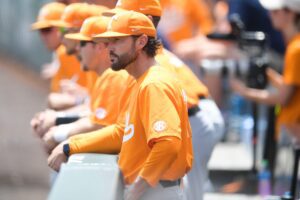Knoxville native Stephen Mozia represents Nigeria in 2016 Rio Olympics
Despite being born and raised in the United States, Knoxville-native Stephen Mozia will represent Nigeria during the 2016 Rio Olympics as a shot putter.

Jul 8, 2016; Eugene, OR, USA; Tavis Bailey competes during the men’s discus throw final in the 2016 U.S. Olympic track and field team trials at Hayward Field. Mandatory Credit: Kirby Lee-USA TODAY Sports
Stephen Mozia doesn’t perform a cultural juggling act.
Despite being born and raised in the northeastern United States for the majority of his life, he is a first-generation Nigerian and undoubtedly a thorough representation of the culture.
“I wouldn’t say I have two cultures,” Mozia said at Ray & Lucy Hand Digital Studio on Monday evening. “I definitely say I think like a Nigerian person. It’s very common for a first generation person to just be raised in their culture even though they’re living in America…so I feel the way I live is still like a Nigerian person. There are still some cultural differences like some things I disagree with my parents with, but I don’t think of it as juggling, just living my life, it’s what I’m used to.”
Mozia is also used to success. The Knoxville native attended Cornell University, an illustrious Ivy League private university located in Ithica, New York. Before being able to finish his last final exam, he received a job offer from Emerson Electric in Knoxville, where he currently works as a sales support engineer.
While at Cornell, Mozia additionally engineered a repertoire of skills necessary to compete in the world’s most revered sporting event: The Olympics.
Mozia is one of four Knoxville-natives who will compete in the 2016 Rio Olympics. The eight-time All-American shot putter and discus thrower for the Big Red qualified after throwing 19.84 meters in men’s shot put at the 2016 Africa Senior Championships, earning him a bronze medal.
Predictably, Mozia won’t represent the nation he’s lived in for 22 years. Rather, he’ll compete for the nation and culture he represents.
“Nigeria is my home,” Mozia said when asked about the significance of representing the African nation. “It’s always been a dream of mine. The United States is the powerhouse of track, it’s definitely the best track place in the world, but to get a medal for Nigeria would just mean the world to me because they’ll appreciate it so much.”
Mozia and his immediately family travelled to Nigeria six or seven times when he was younger, but as school became increasingly prominent, the trips became less frequent. But he retains fond memories of his home, such as the time he attended his grandmother’s 92nd birthday.
“It was probably the funniest moment of my life,” Mozia recalled joyfully. “Each generation wore different colors and mine was gold and it was like thousands of us…well, not thousands but about 120 people and we’re all connected to one person. It’s a large family.”
The 2012 London Olympics drew in an estimated audience of 215 million people. In what is surely to be another example of global viewership at Rio, Mozia’s trainer – UT assistant coach of throwing events John Newell – detailed what to expect from a mental standpoint during the Olympic process.
“It’s a huge experience unlike any competition you’ll go to throughout the year,” Newell said. “…You’re there for a month…Mozia throws a week after Tavis (Bailey)…so the ability to stay focused is key…getting back into simple training and preparing your mind for the day of competition is huge.”
Because of the Olympics sheer size and significance, track and field athletes must adjust to a routine featuring extended waiting periods and lower warm-up opportunities.
“They might go warm-up at the track and sit around for an hour and then go out to the actual Olympic stadium where they’ll get about two warm-up drills when they’re used to getting four or five,” Newell said. “So they need to stay mentally sharp for not just two hours like a normal competition, but for about four to five hours. Then, it’s about getting through the qualifying round and making it through the finals and remaining fresh.”
On the road to Rio, Mozia juggled working an 8-to-5 day job immediately followed with sets of rigorous workout routines. Despite looming large with a muscular build paired with—as Newell described—a unique shot putting style, the training regiment for a track and field athletes offers very few days of optimism.
“Track is a very unforgiving sport a lot of the time,” Mozia said. “You can probably count all your good days on one hand.”
Despite the challenges, Mozia exudes confidence, believing that the world record shot put of 23.12 meters set by Randy Barnes in 1990 is within his grasp. Training with Tavis Bailey – a discus thrower at UT from 2012 until 2015 and Coach Newell certainly helped build that confidence and determination to strive for gold in Rio.
“Where you find success with athletes is their ability to keep their composure through the qualifying rounds and make sure they save something for the final,” Newell said. “But what an experience it is.”
Edited by Jordan Dajani
Featured image courtesy of Tennessee Athletics
Follow me @DavidJBradford1 on Twitter, email me at dbradfo2@vols.utk.edu for any questions.



